#Idealism vs Nihilism
Text
Connected to prev post:
This is also another contrast between Sonic and Shadow as characters.
Shadow’s formative experiences with technology and industry pertained to preserving life, specifically Maria’s, and purportedly the betterment of mankind; it was later, when GUN raided the ARK, that he learned how technology can be wielded as a weapon.
Sonic’s just the reverse; Eggman’s industrialization stole his friends and destroyed the biome’s he called home. It wasn’t until he met Tails that he saw how tech might be used for good.
#Sonic#Shadow#Sonic the Hedgehog#Sonic is really spoiled for choice for foils#Idealism vs Nihilism#Duty vs Freedom#Fate vs Choice#Bully vs Hero#Outward Perception vs Moral Compass#anyway#this is also partially where Shadow’s resentment toward humans stems from#ofc there’s Maria but also forever complicating his relationship with technology#Bruce talks about
5 notes
·
View notes
Text
Recent hsr quest got me ruined..... sunday what a beautiful antagonist u are. And for his sister still be there to catch him. I love them both
#theres so many damn themes covered this arc???#nihilism; polarity of idealism from ppl who only wished to help save others while not knowing the full consequences; existentialism#disabled body and what does a good death mean for someone#absurdism vs order#god this quest cleared me
1 note
·
View note
Note
Going anon because this is a sensitive subject in fandom and I don't want to offend anyone.
I'm don't 100% agree but you inspired me to take a closer look at the Blood Brother ep. I've never seen it analyzed like that, and although your words bothered me, I think you had some good points. I don't think the fandom idealization of Benny is as bad as the fandom version of Sam, but your argument that similar forces are at work for both of them is really compelling.
I never really cared about Andrea, but everything you said has given me pause, but I think you might be right and the illusion in The Werther Project is a lot closer to the actual Benny we see on screen.
I love your take on Andrea, and I'm with you that it might've have been cooler and more of an unexpected twist to see her in purgatory instead during season 15! I love your brain!
Happy to give you something to ponder, then! It's sometimes fun to entertain the shadow selves of characters, and I think the treatment of Andrea Kormos toes the line of darkness and nihilism in a way that is often overlooked. :-)
TBF, I think all soldier-coded characters struggle with this. Michael, Dean, Cas, Mary, AU Charlie and others...struggle with this pretty often. It's not unique to his character per se. It's that old soldier-coded derealization. I feel like it's especially strong/most pronounced in the in child-raised soldiers, ones who've been raised/created to fight (Dean, Mary, Cas, Jack, etc).
///
But anyway, I like this angle because it compels me, not because I dislike any of the soldier-coded characters. After all, it's a bit unflattering to be a soldier, fighter, warrior, (cop, hunter, military, angel, etc etc etc) in the first place!
But the idealization of Benny feeds into the strange imho idealization of Purgatory, that "pure" is somehow a positive thing when it's applied to Dean-Cas (it almost-never is in SPN, and I don't think it is here either). I think the whole existence of Purgatory is a nod to the worst selves of the soldiers, that black-and-white mentality and "rigid code" that both Dean and Cas tend to fall into...as well as suicidality and checking out of the complexity of "civilian" life.
When Benny says he doesn't "fit" and he's no good here, he's embodying the soldier who goes back. It's alluded to with, "The guy who got out and then came back. Like an idiot." It's got a name: "The Back There Paradox."
Deployments, and especially combat deployments, were a place where we knew how to use the skills we had developed. What we did was significant...Life could be very simple while deployed; get up, do your job... Sure, it got boring and repetitive, but we knew how to do stuff and we knew where things were. It was familiar."
We see this too with Dark Kaia in season 14-15: " At least over there, I understood things -- the world, my place in it."
What I'm saying is that soldier-coded characters' rigid adherence to "rules" can be just as neurotic as Sam's moral relativism spirals. (Cas is super fascinating because he embodies both tendencies!)
Purgatory represents "unthinking war," where there's 24/7, 360-degree combat. It's the horrific bloodlust that many soldiers are often too ashamed to admit they're addicted to, what is often quoted as: should "stay overseas, unsaid." It's the secret shame veterans won't readily admit to but many understand and know all too well.
Dean even shows signs of this in his fantasy world in AU Michael's bar, with the fame he crows about here (14x10, Nihilism):
DEAN: What you got?
PAMELA: (wiping Deans face) Worst part of working here is having to clean up the blood after some pissed-off monster busts in to kill you.
DEAN: (smirking) Well, what can I say? I'm famous.
///
"Being exposed to the adrenaline and the fame associated with being a soldier creates a dangerous addiction.
Many veterans that deployed to combat come back to the states and chase the high that they felt on the battlefield."
x
///
The unusual thing with Dean and Cas, is that they each recognize the nihilistic soldier in each other...ranging at times from joyful nihilism to the suicidal sorrow that's all wrapped up with identity-as-soldier-"weapon" and seeing combat far too often. (THIS is the subtext that attracts so many veterans.)
But the thing that's different for them is that they're crazed to get each other out. Underlined in two separate throughlines in season 8 and 15.
This is a little bit echoed in Alt Mary and Alt John, who also want to get each other out of hunting in SPNwin. That's what attracted Mary to John initially, that he was a soldier with a big heart even though he'd seen The Horrors.
Anyway, what I'm trying to say is. I have a soft spot for the soldier who try, have tried, and are trying to get out. Even when they fail, like Benny did.
///
Anyway, soldiers are "loyal dogs." We see Dean referred to as a dog as late as season 15, when Lucifer calls him old "faithful," (like a dog) in one of Chuck's alternate endings. They're also "fish" (out of water). Bait. Bombs. Hammers. Blunt instruments.
They struggle with feeling perpetually dislocated when they're away from combat.
That’s where the, “I’m not sure what’s real” primarily stems from.
#complex benny#nihilism#season 8 and mirages illusions and idealizations#andrea kormos#sorry went off on a purgatory tangent again#benny and nihilism#dean and nihilism#the tragic rigidity of soldiers#mary stuff#benny stuff#dean stuff#cas stuff#john stuff#au charlier stuff#etc etc all the soldier characters#spnwin#anyway benny gets a raw deal when he's simplified to a queer caricature - the two subtexts are equally important and valid!#combat addiction#spn vs nihilism#meaning vs nihilism#meaningful story VERSUS meaningless story#eileen adjacent#good soldiers#mary adjacent#chuck voice: you make a good soldier not by force but by getting them to choose it#existential crises
0 notes
Text
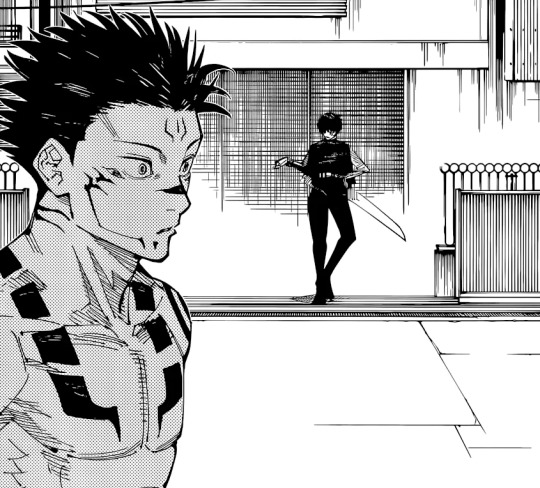
Maki Zen'in vs. Ryomen Sukuna
The past two weeks Maki has faced off against Sukuna. While it seems that Maki and Sukuna's face-off has followed the traditional formula of every individual Sukuna has squared up against so far. That being Sukuna fights them trying to bring out their best, praises them before swiftly defeating them. It's followed the formula so far, with Gojo, Kashimo, Higuruma, and Yuta. Yuta surveys their "taste" as unique sorcerers, and then quickly consumes them.
However, I am going to argue that there's a reason Sukuna takes a special interest in Maki that differs from Gojo Kashimo, Higuruma and Yuta and it's because the two of them foil each other.
1. Skin and Blood, Bone and Marrow
To badly quote Kant, and Johane Fichte thesis and anti-thesis are both necessary in order to make a statement.
Immanuel Kant's Critique of Pure Reason (1781) created the thesis / antithesis dyad, within two statements.
Thesis: "The world had a beginning in time, and is limited in regars to space."
Antithesis: "The world has no beginning and no limits in space, but is infinite, in respect to both time and space."
Fichte turned this dyad into a triad. A set of two contradictory ideas that is resolved with a third statement, synthesis. In order to make of synthesize a new idea, thesis and anti-thesis must meet first.
Are synthetic judgements a priori (before / precending) possible?
No synthesis is possible without a preceding anti-thesis . As little as antithesis without synthesis, or synthesis without anti-thesis, is possible; just as both cannot be born without thesis.
In other words no idea cannot exist without the opposite idea, and no new statements / judgement can be made without exploring these two ideas in opposition to one another.
I spent so much time explaining this philosophical concept because fights in Jujutsu Kaisen aren't just excuses for Akutami Gege to add more elaborate rules to the power system, and give the power-scaling bros more material to argue about. They are a clash of ideals between the two characters fighting, oftentimes with both characters embodying opposite philosophies. At this point it's not subtext, but literally text, Sukuna calls fights a clash of ideals.

Sukuna is not just fighting to physically conquer Yuji, at this point he wants to win in a clash of ideas to, he wants to disprove the ideals Yuji carries in his heart and all that he represents.
Mahito too, all the way back in Shibuya, called his fight with Yuji a clash of truths, rather than the fight between good and evil that Yuji imagined it to be.
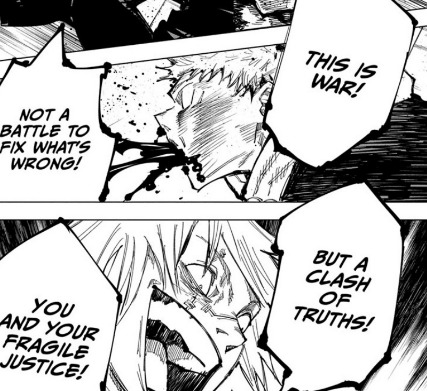
Thesis and Anti-thesis are both necessary to make a statement. Yuji cannot prove his ideals to be true, without clashing with Sukuna first, and the same for Sukuna, Sukuna can no longer disprove Yuji's ideals as false without recognizing his ideals and fighting them head on.
There's a statement on twitter I want to steal that summarizes the matchup of every mini-arc in the Sukuna fighting arc so far.

To summarize Lmfalolawholebunchanumbers point, Mahito and Sukuna acting as antagonists challenge the ideals of the protagonists, but while Mahito represents the reverse of humanity's ideals, Sukuna is against the concept of hodling onto any consistent ideology himself. Sukuna in fact believes that all the ideals of the sorcerers that challenged him in the past were false and flimsy, and is troubled by the fact that Yuji holds onto his ideals no matter what.
I already somewhat explored this in this meta, Sukuna's Anti-Enlightement. Where I argue that Sukuna's ideals resemble nihilism, but even then I wouldn't label Sukuna a nihilist because Nihilism is still a set of beliefs and Sukuna doesn't seem to hold onto any consistent ideology or belief system at all. Trying to assign any human branch of thought or motivation to Sukuna doesn't quite work, because Sukuna's point of view isn't one of a human, but more like an inhuman curse, or even a deity. In other words a calamity.

"Whoever fights monsters should see to it that in the process he does not become a monster. And if you gaze long enough into an abyss, the abyss will gaze back into you.”
Beyond Good and Evil Part IV Frederick Nietzsche
Nietzsche used the abyss as a metaphor to summarize the unknowable psychological complexity of human beings. You stare at the abyss trying to comprehend it. Which means when facing the abyss, the abyss forms in your mind. Anyone who tries to understand humans must face the fact they are incomprehensible. Anyone who tries to create some meaning to life must confront the fact that the world is so ridiculously overcomplicated and random it's impossible for the human mind to fully comprehend.
The abyss as it exists is a place of danger where it's easy to lose sight of your search for meaning, or even yourself, but in order to grow you have to confront the deepest, darkest part
Anyone who tries searching for the truth, risks confronting the idea that they may be wrong, risks questioning their values, risks confronting the fact that what they believed meaningful might have no meaning at all - and therefore the abyss widens inside of them, they might abandon idealism all together.
Anyway, enough boring philosophy more or less every single person who fights Sukuna risks having their ideas feel false. Or to paraphrase the twitter user I quoted above, most of the characters that try projecting their own human ideals onto Sukuna, find not only do they misunderstand Sukuna entirely, but Sukuna doesn't care about their ideals and disproves them.
Gojo and Kashimo (and before them Yorozu) all try to fight Sukuna, believing they could make Sukuna understand them and understand Sukuna in turn only to find they were misreading Sukuna entirely.

Gojo makes a big deal of trying to bring out Sukuna's best to prove that Sukuna is not alone standing on the top, only to be met with Sukuna basically going "I don't really care."

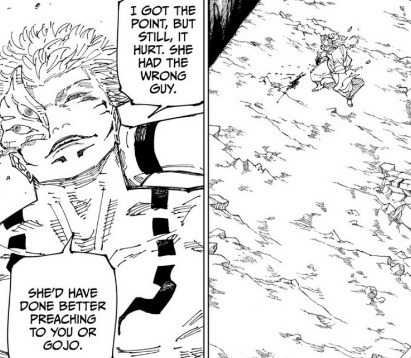
When you confront the abyss, the abyss opens up inside of yourself and your ideas may prove to be false. No one who's faced Sukuna so far, has been able to conquer that abyss, in fact Sukuna keeps rendering their ideals to be false. Perhaps because they are just projecting ideas onto the abyss, looking at Sukuna instead of looking at the abyss inside of themselves.
They want something from Sukuna that Sukuna can't give them, they're looking externally for Sukuna to give them easy answers instead of looking internally. Not one of them is able to form a new idea or make a statement because they're not willing to confront anti-thesis.
The exception to this pattern so far is Maki. There's a reason I've been hammering on about the abyss so much, it's because in this most recent chapter Sukuna calls Maki "a true void."
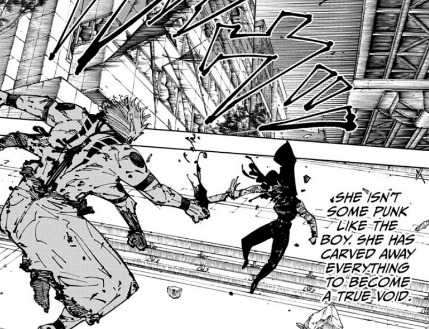
In one sense, there's the technical power system reason why he calls Maki a void. Maki is someone who gave up all cursed energy in order to strengthen her physical body, whereas in comparison Yuji who also mainly fights with his body and super strength, but unlike Maki, Yuji hasn't broken away from cursed energy and is instead soaked in Sukuna's cursed energy.
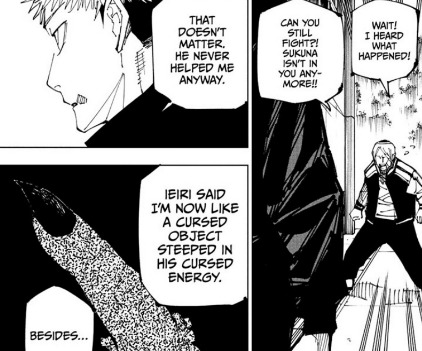
However, not only has Maki cast off cursed energy, unlike Yuji who has suppressed his own identity to become a cog in favor of his ideal of having a role and supporting other people, Maki has let go of the idea of protecting others and instead focused entirely on the idea of improving her own strength.
Though, not entirely by choice as Mai sacrificed herself, but Maki's awakening and becoming of herself happened when she let go of Mai, and protecting Mai or reforming the Zen'in for Mai's sake. Not only did Mai take cursed energy with her when she died allowing Maki to break free of cursed energy, but she also let go of her ideal of protecting Mai. Losing her cursed energy went hand in hand with losing her "goal" and almost immediately afterwards she loses her goal of trying to prove herself to the Zen'in or become clan head and just exterminates them entirely.
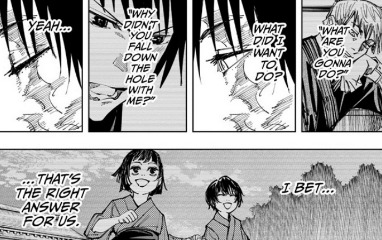
Everything Maki lived for is gone, so what does Maki live for now? Herself mainly, and the concept of total freedom that comes with no longer tying yourself to others.
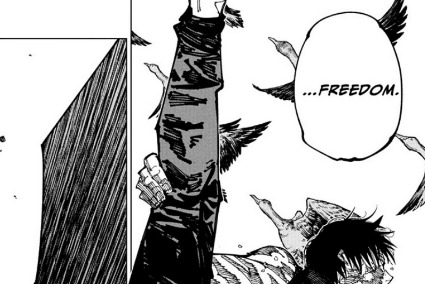
In that way, I'd say that Maki almost resembles Sukuna the most, because if Sukuna represents the void that others must confront Maki is the only character that has opened up the void inside of herself. As Sukuna said unlike Yuji who's half-assed in his idealism, Maki's shaved away everything and is contemplatng the void. Almost to reflect this, Gege's done away with most of Maki's internal narration and most of her internal dialogue is focused on either how to win, and how to bring out the fullest of her abilities.
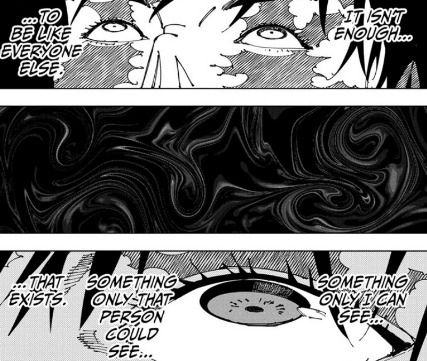
Maki's opened up and contemplated the void inside herself, and in that way she's done away with self-doubt like most of the characters are facing, she's not projecting her anxieties onto Sukuna or wishing for him to answer or resolve her identity crisis like Gojo and Kashimo. She doesn't even have an identity crisis.
In fact, Maki and Sukuna resemble each other so much by both having a void inside of them it makes me wonder if Twin Theory is true that Sukuna also achieved his perfection in Jujutsu by either fusing with his twin in Uterus or cannibalizing his twin somehow.
Even in the fight itself, Maki's the one who's most laser focused on winning, whereas Yuji and Yuta's strategies fail because they're too concerned with saving Megumi who himself at the moment does not wish to be saved. (Saving Megumi is a good thing though, I'm just making a point that Maki much like Sukuna only sees herself winning the fight and prioritizes that above everything else. It's not like she's against saving Megumi either she didn't argue against Yuta and Yuji taking a shot at it). It's just she's the only one who like Sukuna only sees the fight in front of her and doesn't worry about other people. She's laser focused on the win is what I'm saying).
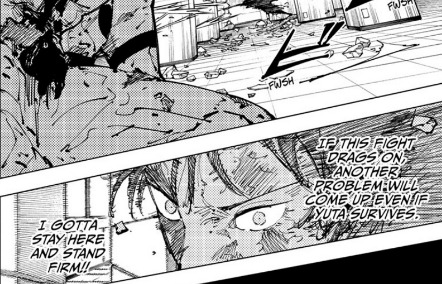
I don't think it's just the fact that Maki has cast away cursed energy that's drawn Sukuna's attention, but the fact that while she represents his anti-thesis focusing on only strengthening the human body, they also share many similarities between them.
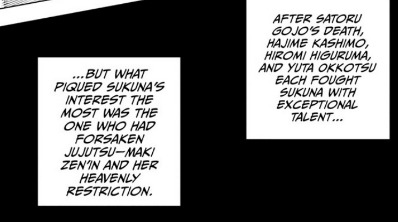
They're both the void.
Sukuna even says that Maki's existence denies Jujutsu itself.
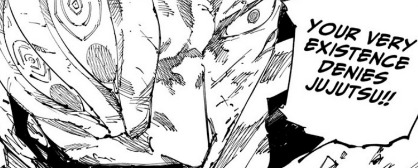
Sukuna says that Maki is the only person who's forced him to have a role, and in a way that's true, because by denying Jujutsu, she represents the void that Sukuna has to contemplate now. In a way she's played an uno-reverse card to Sukuna's philosophy of revolving his entire life around strengthening Jujutsu and being the height of Jujutsu.
Sukuna now has to prove Jujutsu's superiority and contemplate the fact that is ideal might in fact be wrong.
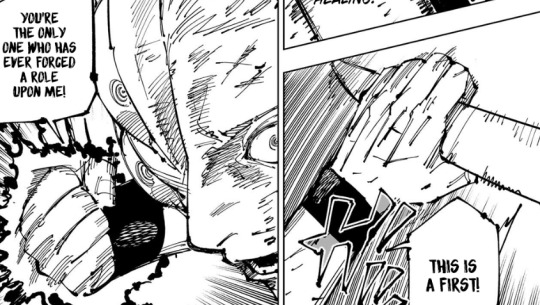
Sukuna and Maki both represent the ideal of what one can achieve in the pursuit of strengthening the body, versus strengthening Jujutsu, Hajime even comments that Sukuna's body is absolute perfection.

Not only that, but they both represent the opposing philosophies established by Kenjaku and Yuki, Kenjaku sees the future evolution of humanity as optimizing cursed energy, and Yuki envisions a future of breaking away from cursed energy entirely and even namedropped Toji and Maki both as examples of those ideals.
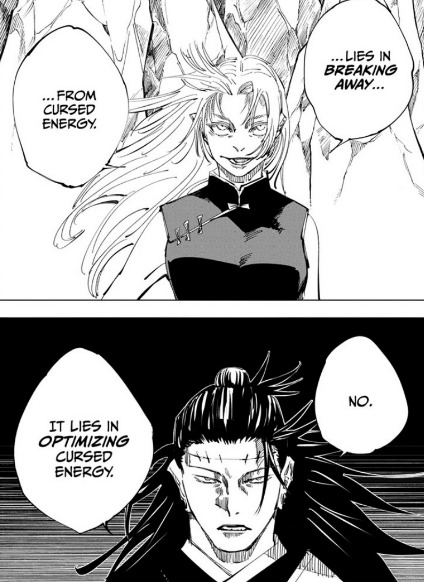
There's a reason that Gojo is troubled by Toji and remembers his loss to Toji years after the fact, Toji deeply troubles Gojo not because he beat him in a fight and caught him off guard but also because his existence challenged everything Gojo believed to be true.
Gojo is the first inheritor of the six-eyes, and Limitless in hundreds of years, he exists solely for Jujutsu as Nanami said, he was also someone who was arrogant at seventeen and was handed everything at birth, who has always been held up on a pedestal by Jujutsu Society. Yet the only person who seriously challenged Gojo and forced him to evolve before Sukuna rolled around was Toji, someone who is the scapegoat of Jujutsu Society, and who is looked down upon by the the three clans. Suddenly, the inherent superiority that Gojo believed in, all the things he thought made him great b/c he was the peak of the Jujutsu world was called into question if a mere monkey could challenge him.

Toji too, stuck around and fought Gojo because he felt a pressing need to disprove the philosophies and ideals that Gojo represented. However, Toji in this fight lost because he succumbed to the void.

He deviated away from his set of ideals and fell prey to his inferiority complex rather than staying true to himself in face of the void.
Gojo's enlightenment itself comes from facing the void that is Toji Zen'in, and then conquering that void by conquering his own biases against Toji that made him let his guard down. Yet, his defeat against Sukuna comes from the fact that he couldn't conquer the void, he couldn't find his own answers instead relying on Sukuna for an answer and because of that Sukuna reduced him back to a human being again with the world cutting slash that cut through the infinity.
In other words in just two chapters Maki vs. Sukuna have embodied a philosophical battle that has been raging in Jujutsu Kaisen since basically Hidden Inventory, and maybe even the beginning of the manga itself and it is what do your ideals, the ideas you live for mean in face of the void / death. Are they worth holding onto, can you create a synthesis from confronting and overcoming your antithesis, or will you too succumb to the meaninglessness that Sukuna represents?
How do you find meaning in a world where death is random, where anyone can die at any moment, a world that is inherently unfair where good things happen to bad people, and selfish monsters like Sukuna get whatever they want who win because they are selfish and step all over people and take what they want.
Confronting Sukuna means confronting the fact that the world may be empty, and we may all be just killing time until we die.

The lines skin and blood, bone and marrow which is what Sukuna uses to refer to the source of is strength (Jujutsu) and the source of Maki's strength (the physical body) are a reference to Bodirahma asking his disciples to understand his teachings.
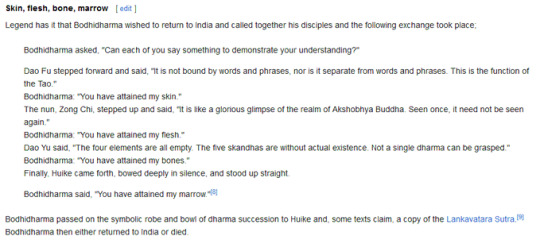
"You have attained my skin. You have attained my flesh. You have attained my bones. You have attained my marrow."
In other words neither Sukuna and Maki are entirely right, the true understanding comes not from Jujutsu, or the Body, but from both, from skin, flesh, bones and marrow.
In other words, a statement requires thesis and anti-thesis. It's not Maki and Sukuna that are right, and something can be learned from the clash of their ideals.
What I'm saying is basically that JUJUTSU KAISEN is a story with THEMES and I love it.
#maki zenin#ryomen sukuna#yuji itadori#satoru gojo#jjk meta#sukuna#maki zen'in#jujutsu kaisen meta#jujutsu kaisen theory
102 notes
·
View notes
Note
hi! i was thinking about the difference in kaveh’s reaction in a parade of providence’s ending when it is alhaitham vs the traveler telling him about his father with relation to sachin. with traveler, kaveh readily and openly admits that he still feels guilty anyway. with alhaitham, he curiously doesn’t, and I wonder if that’s conscious or unconscious. Does he know, however subconsciously, that alhaitham disagrees with him feeling guilty over his father’s death, or that alhaitham was trying to help him overcome that guilt? but he is not ready to let go of it so he specifically doesn’t mention it to not provoke a discussion and give alhaitham the chance to further show him reasons why he shouldn’t feel guilty? both to avoid being swayed and more arguing about a painful topic… (or maybe he just got distracted by alhaitham’s teasing about ‘thank you’s. or maybe the teasing was alhaitham’s olive branch and a way to go back to their usual banter because he knew the new info was still not enough and kaveh wasn’t ready yet…)
anyway, just wondering about how kaveh, while having no problem discussing delicate and private matters with alhaitham (this conversation, and then when he was homeless at the tavern) presumably because he trusts him and still feels close to him in a familiar way, is very, very careful to not mention his guilt still… could also be trauma after their final thesis argument, maybe?
hiya!! thank you so much for this ask!! HAPPY ONE YEAR TO A PARADE OF PROVIDENCE!! <333
you raise extremely valid and scrummy points, thank you for giving me an opportunity to talk about this event hehehe
i think it's deliberately ambiguous as to kaveh's thinking here, as you've said, with the traveler, kaveh openly admits that although his father's depressive slump after the interdarshan championship and him joining a research project in the desert wasn't directly connected to him, rather it was sachin's influence, kaveh still believes he was the catalyst for this chain of events, and therefore he believes he is still to blame
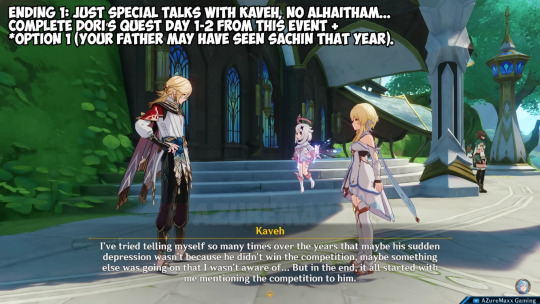
with alhaitham, however, this mention of guilt is omitted, and kaveh thanks alhaitham for letting him know about 'all this', which reads not only as alhaitham letting kaveh know about sachin's influence over his father, but also as a reference to their discussion about their respective philosophies - with alhaitham concluding that their issue is not who is right or wrong in their approach to life, because as is concluded within this event - 'correctness' is a subjective way of thinking; alhaitham being 'right' about egoism, or kaveh being 'right' about altruism, ultimately doesn't matter, but, to alhaitham, what does matter is sacrificing oneself for the sake of a subjective ideal - this is a fate he does not want for kaveh
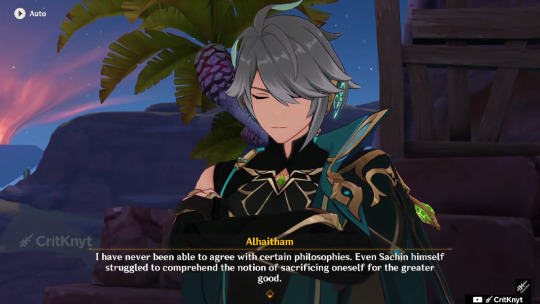
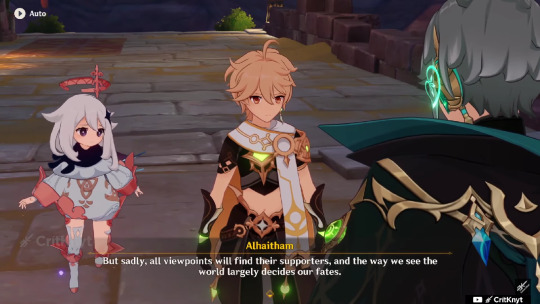
the difference in context between the traveller telling kaveh about sachin versus alhaitham, is that kaveh knows that alhaitham is looking into sachin but he doesn't know why alhaitham is specifically interested as he (rightfully) knows that alhaitham isn't interested in nihilism. this contradiction in alhaitham's behaviour is such an issue for kaveh that he repeatedly questions it within the remainder of the event after discovering alhaitham's note, seemingly about sachin, but addressed to kaveh in a language only they know. when the traveller reveals the news to kaveh, this context is removed, and the connection between the discovery and alhaitham is severed. the element of personal has been omitted.
when alhaitham tells kaveh the news, however, kaveh questions why alhaitham is interested in sachin's research, only for alhaitham to tell him that it isn't because of philosophies at all - it's due to sachin's connection to kaveh's father. this is personal. alhaitham is the only one who knows about the source of kaveh's guilt, in comparison to the traveller and paimon, who kaveh evaded confiding in. it's revealed to kaveh here that alhaitham has personally looked into this matter for kaveh's sake - but the question left unanswered is why?
in terms of kaveh's understanding of alhaitham, this is a pretty big deal, since kaveh interprets alhaitham as constantly criticising his ideals and his philosophies (whereas, alhaitham is actually highlighting the detriment of kaveh's pursuit of his ideals). alhaitham openly stating that they have moved on from asserting 'correctness' over each other, and that this isn't the issue, actively prompts the question of what the actual issue is - coupled with this is the impact of alhaitham's actions in this event. alhaitham leaves kaveh a cryptic note about the idealist never being able to accomplish happiness for themselves if they detriment themselves for the sake of achieving happiness for others, which kaveh (rightfully) doesn't understand in relation to sachin. and then alhaitham reveals to kaveh that he looked into his father's disappearance, and kaveh is not the sole instigator as he believes himself to be.
your point about kaveh's guilt never openly being discussed is crucial here i think in terms of subtext. the source of his guilt, being his belief he lead to his father's passing, is questioned by paimon and the traveler, to which kaveh evades telling them. alhaitham is the only person who does know the reason kaveh detriments himself in his altruism, as shown in their argument in their akademiya days. alhaitham looking into sachin must tell kaveh something, but again, it isn't revealed exactly what kaveh thinks, and alhaitham never reveals the reasons why he looked into it, and what he hopes to achieve.
although i think this is more due to narrative reasons, the wounds left from their argument are definitely a factor in this evasion of mentioning kaveh's guilt - a parade of providence deliberately highlights the miscommunication between alhaitham and kaveh, and this is solely due to their past argument. kaveh not mentioning his guilt could be because he doesn't fully understand why alhaitham has looked into this incident for his sake, and alhaitham says nothing more about it because he knows it's still too early for kaveh to process - narratively, i think this is what's at play here
alhaitham teasing him is definitely a way to revert back to their normalcy, however, i also think it serves as a distraction - and it works!! kaveh is relatively cheery in comparison to how upset (as described by paimon) he is when the traveler tells him the news. narratively wise, i think it's a good place to leave it as nothing is inherently confirmed - the potentiality for kaveh and alhaitham separating is eradicated; kaveh and alhaitham continue living with each other, and kaveh is seemingly no longer intent on moving out of alhaitham's house, having thanked alhaitham for his words, rather than finding them 'infuriating'. this is an open ending and gives their narrative arcs freedom to potentially (hopefully) be developed in the future
(from the leaks, i'm going to say that the 'good' ending, or the ending that coincides with the arc that these characters are undertaking, is the ending in which it is alhaitham who tells kaveh of sachin's involvement with his father - i'll have more to say about this at another time!!)
Thank you again for your ask?? Your points were really insightful into their messy little psyches!! Everything you said rings true <333
#haikaveh#kavetham#alhaitham#kaveh#alhaitham x kaveh#a parade of providence#haikaveh meta#genshin meta#your ask is tickling my brain stem#i was going to post about a parade of providence at some people since its one of my fav parts of The Essay#but your ask has new introspectives that are so interesting!?? <3333#can they please just talk.#also alhaitham saying 'sadly' is reference to kaveh chasing happiness for all but not including himself in the 'all' what if i screamed#also what do you mean that having the traveller tell kaveh about his father is a bad ending and that alhaitham#being the only one to truly know kaveh inside and out telling kaveh is the good ending#we've been stuck here for a year!!
34 notes
·
View notes
Text
ok since we are on liminal spaces and the riverlands and the whole idea of time, history, and transition etc. an overwhelming majority of jaime’s story takes place there, nearly all of it, which is very interesting considering how dynamic he is. he is on a huge internal journey, as well as him being in constant motion literally too. his character’s unraveling happens there. he gets symbolically killed by the arakh, the scythe blade, and chooses to continue living under the crescent moon. just like arya, the moon is relevant to him too, and it is undergoing an interesting cycle all throughout his arc. we jump into the literal and metaphorical pit with him in the riverlands. it is the idea of stagnancy (chained up in the dungeon for a whole book) vs evolution. death and rebirth. the moving river is something that is established in his very first paragraph as a pov character.
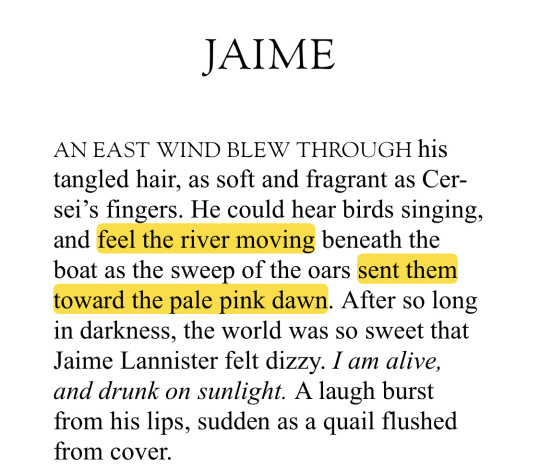
and harrenhal specifically is very much a trip into the past for him. he is dragged back there and forced to confront things that he had previously ran away from. he is forced to revisit the corpse of the boy.
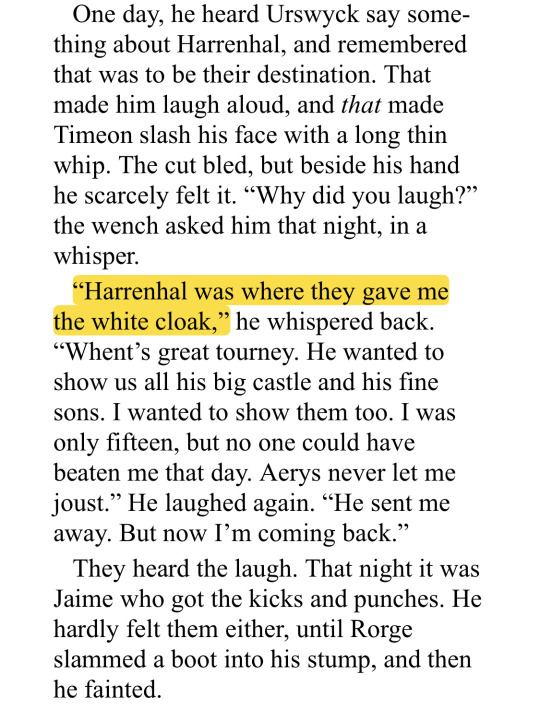

the setting is used in such an interesting way. of course he makes the bath confession there, it is the only time he lets that resurface. he is “naked as his name day”, “half a corpse and half a god.” it is about washing off the dirt and “darkening the water” and being reborn. the riverlands is such a crucial symbolic location to his arc.



“I left something at Harrenhal.” is not just about brienne. it is about the boy that died. the boy that was not afraid to dream and to believed in heroism. when he goes back to harrenhal to save brienne he goes back for himself as well. it is about rejecting the moral nihilism that he escaped into. the motif is so good: “He sent me away. But now I am coming back.” and “He would be back in that dark wet place again” and “I want to go back.” then finally “… you were well away. Why come back?” and he gives such a layered answer.
but of course that is not the end. the world is still more complicated than that boy and his dreams of knighthood. the world only seemed simpler because he was 15. and then in feast the same journey is repeated, he goes back again, but this time with ilyn, who is more symbolic of the man jaime eventually became after the death of the boy, and all of the darkness of that. the lannister executioner: a sword for death. it is also about development and confrontation though. if storm was about symbolic rebirth, feast is about symbolic maturing: looking at the lack of a golden hand and facing the ugliness of the stump, the metaphorical empty space that was left. it is about the death of certain dreams and delusions, ones that are rooted in a false reality. it is a set up for cost. but that does not mean we stop. the river keeps moving. and it sets him up for a continuation of that journey, another confrontation and key transitional point. he is gonna have to visit another corpse soon. and with the woman that rekindled hope in him in the first place, someone whose own idealism and innocence is now also being challenged and withered. and it is about finding light and retaining your humanity despite that. there is a reason brienne’s light keeps burning in jaime’s dream, and he is not left in utter darkness when the ghosts rush in.
138 notes
·
View notes
Text
So I recently got fully caught up with the JJK anime and am now on chapter 176 of the manga because I was bored. I basically went through a “wow I get it” moment when it comes to why people like this series so much.
While reading though, one thing I found interesting is that Gege-san seems to really like Nietschze. Nihilistic philosophy, especially passive vs active nihilism, comes up a lot in this series. You mainly see it in characters like Geto, Gojo, and very much with Mahito. The meaning of life or “the meaning of the soul” is a common question that comes up, with each character having their own views on the meaning of themselves and their place in life.
I’ve been liveblogging my experiences in a discord server and me and another person have real interesting conversations about how Geto seems to symbolize the passive nihilist, while Gojo is the active nihilist or the absurdist. Mahito is basically a twisted form of active nihilism.
The passive nihilist is a person of resignation, it is described as a person of weak will that views nihilism as the end to life and nothing beyond that. They often fall into violence or herd mentality in a scramble to give themselves some meaning or accept destruction. Nietzsche described it as “pessimistic Buddhism”.
The active nihilist is basically the exact opposite. Through the destruction of the meaning of life, they go in to construct new ones by their own will and ideal. They are free and of strong will and are often opposed to authority figures and find rebellion in their creative meanings of life.
I think this is a pretty good reflection of Geto, Gojo, and Mahito. Geto, who spiraled due to the shattering of his ideals and resorted to despair and destruction to find a new one. He became resigned from world, resigned from others. Gojo’s past ideals were also shattered, but through that he built a new one. He is completely absurd and humorous even in serious times, but he ultimately cares a lot about aiding the future generation and does so by rebelling against the higher ups of Jujutsu Society.
Mahito is an interesting case. His whole character is basically just a philosophical analysis of nihilism and the meaning of life and the soul. He is creature of free will to the most dangerous degree. That, since there is no meaning to life that means one has the free will to control other’s lives, or even take them away. He revels in the despair that he spreads, he fully believes that he has the free will to do so.
Now, the reason why there is probably so much “meaning of life” talk in this manga is because it has a lot of Buddhist imagery, so it’s possibly an analysis in Buddhist philosophy- but I still think that this manga can be viewed through the lens of nihilistic analysis!
I find manga that get philosophical like this so intriguing! I’m excited to continue reading.
42 notes
·
View notes
Text
Hope is one of my favorite themes in fiction (shocker coming from the GTI, Undertale, and PMMM fan) and I'm just thinking about how RGU kinda balances the idea of cynicism and nihilism vs optimism and hope. Like a major thing the show does as part of its themes is present idealistic fairytale stories and figures only to twist and crush the beauty out of them to reveal the horrifying truth underneath. But after all this there is still a hopeful ending. Utena chases after an ideal to cope with her grief and only ends up with even more harm. But she doesn't give up and strives to help other people until the very end which allows her to escape and give hope to Anthy, who's on the other extreme of being fully convinced that there was no hope and no future for her. And instead of coping by chasing a false ideal like Utena, she grew to become indifferent or even resentful to everything around her. Akio represents both extremes of idealism and cynicism by always talking about how cruel the world is and this is just how things are ect. while also striving to (re)attain an impossible and unrealistic ideal.
7 notes
·
View notes
Text

[Another to do:
Kafka's practice of cognitive/observational empathy + mannerisms (perceived staring, gentle pushing and prodding, making inferences) and common discomfort generated in other (fear, prey instinct)
Concept of Metamorphosis as an act of service and gift of significance
How she strides down the path of nihility (impermanence)
Observation of difference between path striders (those whose experiences align with the ideal) and Emanators (those who embody it) ie: kafka enjoying the impermanence and chaos, emotional impermanence VS acheron's memory + existential chaos
9 notes
·
View notes
Text
I’ve been thinking about Ishmael’s assertion that he wants to stop the wheel because its the only way to end “all this suffering”.
It parallels the ideals of the darkfriend innkeeper we met in season one, but strikes me as strange because of their vastly different life experiences. As far as I recall in the books, Ishy goes to the dark due to the ultimate embrace of nihilism—for the cycle of light vs dark to stop, the dark will ultimately have to win. Why not help it win sooner?
It didn’t really seem to come from a place of compassion for the world’s people. Of course, show Ishy could be lying when he says he wants to end suffering, or he could mean it in an entirely different sense than I take the word. Then, I can only assume by “suffering” he means the perpetual battle between light vs dark, and the infinite # of escape attempts Shai’tan has.
This is all just to pose the question of where the show is going with Ishy. He’s always been the most complicated forsaken, and I could easily see the showing expanding upon that. He’s already become far more interesting to me than his book version, partially just because he’s not as fucking insane lol. He’s also not really violent—we see him forgo opportunities to hurt or kill or compel in almost every scene he’s in. By no means do I think they’ll make him a Nice Guy, but perhaps his manipulation will be a lil more sophisticated and nuanced than making people throw up bats
14 notes
·
View notes
Text
Fullmetal Alchemist Chapter 60
The implications of that opening scene...Roy and Riza have a far more intimate relation than we thought.
When you strip away the color, you can't see Amestrians vs Ishbalans. It's just humans fighting humans. And Envy is laughing at it all.
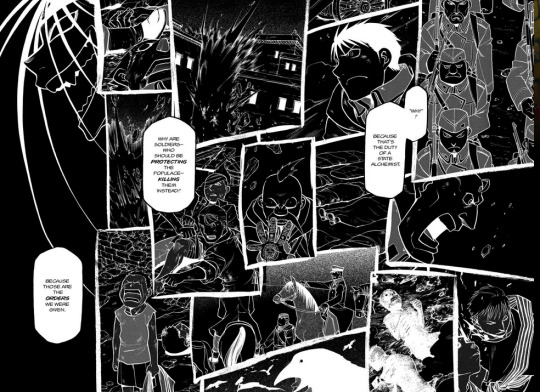
Kimblee's discussion with Roy and Riza is what made him one of my favorite antagonists. He is a villainous character, but he adheres to certain personal convictions that make him more than a psycho murderer, but those convictions do not give him any noble or admirable goals.
Kimblee never pretends to be someone he's not. Last chapter, he killed two Ishbalans Armstrong tried to save, and he did it because he genuinely wanted to protect Armstrong from getting in trouble for it. Armstrong had a moment where he acted on his conviction. He believed what he was doing was wrong and he disobeyed orders to act on that belief. Kimblee responded by making sure Armstrong wouldn't be punished for it. But because Kimblee's own morals are so twisted, his solution was to kill the people Armstrong was ordered to kill.
Kimblee is annoyed that Roy and Riza have no conviction. They put on the military uniforms which means they should know they might have to kill and now they're upset they have to kill. He tells them they should either just mindlessly be a cog in the war machine or refuse to be one. But since they refuse to be either, then they had better remember every atrocity they've committed. "Look squarely at the people you're killing. And don't forget them. Never forget them. Because they won't forget you."
Roy then asks Hughes why he fights. Maybe he's hoping for his own convictions at that moment, but Hughes can only give him the simple answer that he fights so he doesn't die.
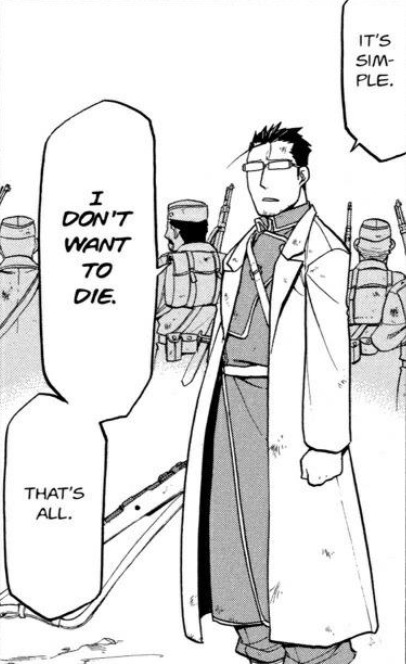
We finally see Basque Gran, the man Scar killed prior to his introduction in chapter 5. And we see a sample of what Gran can do in battle.
The strangest thing about Gran's Alchemy tools I want to point out is there's no discernible transmutation circle on his equipment. He just slams his fists together and can then channel the energies needed to change the stone walls into a heavy artillery. His gauntlets have several Latin words written over them. The only ones I was able to fully make out were 'lapifem' which Google translate says means "stone" and 'terra' which is earth. I would guess the other words are various types of metals and minerals.

And in this chapter we see the underside of the Reconstruction piece of Scar's Alchemy. On the underside, we see the word "AQUA" which means water. In the an earlier panel, we can see part of the outerside. It contains the twisting snake pattern like the destruction arm, but the colors are white. The reconstruction arm's patterns are also inverted. They point up to the body whereas the destruction arm points out to the hand.

back
Spoiler Discussion
When presented the Supreme Cleric of the Ishbalan religion, Bradley mocked the very idea he was anyone of value. His mockery extended to their very god. He asked how many Ishbalans must be struck down before god intervenes.
As he walks away, he calls god a fantasy and imaginary being. The sun then shines in his eye and Bradley remarks that the hand of man is what he must be wary of.
The next time he does this - mocks god as a fake being - the sun will shine in his eye once more, and he will be brought down by the hand of an Ishbalan.
And how strange for Wrath to mock the very notion of god when Father's end goal is to contain god. But then again, he lives with a nihilism that rejects dreams, ideals, and beliefs. So perhaps he doesn't even believe in the purpose he was born with. Perhaps he thinks Father is doomed to fail. And maybe that's why he enjoys watching their plans go astray - because they're proving him right.
The only thing coming close to a belief Wrath has given is his belief that the Homunculi are superior to human. But even that may be false. "It's the hand of man, not god, that we have to be wary of."
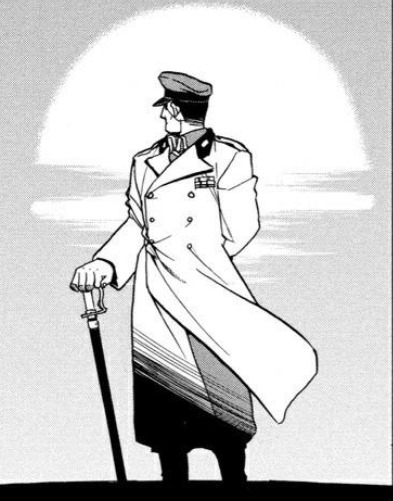
8 notes
·
View notes
Text
BUCKLE UP GHESTIES IT’S TIME TO ROCK N ROLL: A Spillways Dissection
Hello pals please take a peek under the cut for a literal fucking essay I wrote for my theories on the Spillways video because apparently Tobias Forge owns my brain and makes me do weird things with it.

First thing’s first: Copia is pissed at Imperator and is heavily questioning his loyalty to her. I think it’s pretty clear that this is not what he’s wanted, but Imperator is more of the puppet master. We’ve seen what she did to get him to the papacy, she’s clearly had her own plans all along.
Tobias said in a Metal Hammer interview, "Spillways was an elegy for the darkness that most people have inside. When you have a dam, spillways are the run-offs so the dam won't overflow. That darkness inside us needs to find its way out."
It’s about people who have so much hatred and darkness inside of them that they’re taking it out on everyone around them because it’s overflowing. They’re drowning and they want everyone else to go down with them - it could be forcing people into their own ideals and such aka Imperator forcing Copia into the papacy for her own greater plans.
With Spillways being about the behaviors of those shitty people, the Job quote is spoken by Copia and is how he feels about the situation - but “God” in this sense means Imperator. It’s probably very important to note that Job was one of God’s most loyal servants, however God is constantly torturing him. At one point Satan had told God, “Job only loves you because his life is good,” insinuating that if Job can love Him even through darkness and suffering, only then must it be true. Like, duh, of course he loves you, his life is sooo good because of you! Why would he think anything else? So God starts forcing Job to prove himself over and over again even when he has continually served Him for so long.
Job starts questioning his purpose because now it seems like no matter what he does, how he acts, or how well he still serves God - he’s continually met with all of these afflictions and has even lost everything important to him because of God’s need to test his loyalty so mercilessly.
He finally gets to the point in all of his questioning where he’s just like, “I’m probably going to die soon, can I finally just have some peace until the end?” I think Copia is aware that something might happen to him because he's seen it with the other Papas - but Imperator made him into this figurehead? And is also possibly his mother? So why is she doing this to him?
Job 10:8-9 “Your hands fashioned and made me and now you have destroyed me altogether. Remember that you have made me like clay; and will you return me to the dust?”
Job 10:20-22 “Are not my days few? Then cease, and leave me alone, that I may find a little cheer before I go—and I shall not return— to the land of darkness and deep shadow, the land of gloom like thick darkness, like deep shadow without any order, where light is as thick darkness.”
This video coming after Chapter 11 where he's clearly pissed at his whole situation with Imperator & Nihil definitely plays into it all. He’s been treading lightly and keeping his head down and doing as he's told but now he's like “Wait a minute I’m doing all of this shit for you and it's making me miserable!!! WHY me? WHY do I have to suffer for this??”
We can also tie everything into the lyrics for Darkness at the Heart of My Love & Respite on the Spitalfields.
To quote @leshyyx: “Listen to Darkness, to me it sounds like it’s from Imperator to Copia. Her love is dark as she killed the Papas for him and her love is unconditional because she’s his mother and is trying to convince him that she’s all he needs.”
”Will you walk the line? My path serpentine / Remember always that love is all you need / Tell me who you wanna be and I will set you free”
DATHML can even be compared to the themes of Cirice:
“Can’t you see that you're lost without me" vs. “Remember always that love is all you need"
Cirice is about the darkness of religion that hides under the guise of love. It’s like “Oh yes, you’re very special, I will love you for who you are, let me lead you down this path, you won’t be able to find your way without me, trust me!”
DATHML is similar in the sense that as long as you love them/God/whoever, they will give you whatever you need. But that comes with a price. “Will you walk the line? My path serpentine” makes it sound like it’s a test. A serpentine path can mean something winding and shady and difficult - the ‘leader’ is saying if you’re willing to walk this dark path for me, clearly that proves your love. This brings us back to God’s testing of Job’s loyalty, the idea of unconditional love being the only thing you need to make it through. If you love someone unconditionally then obviously you should be willing to go through all of this suffering because you love them, right? That won’t change anything, right?
And that comes back to the song lyrics being about people so bitter with their own lives and having all of this inner pain and rage that they take it out on everyone around them - it’s a cycle. This is potentially leading into Copia going on a rampage. Everything he’s been made to endure by her has built up far too much darkness within him and it’s going to start overflowing. This is going to connect directly into Respite on the Spitalfields..
“We're here in the after of a murderous crafter
The past is spun like a yarn and mangled
With flesh and blood and bones, I wonder
Did no one hear the distant thunder” (this line could be a direct callback to Cirice btw)
He’s going to start tearing shit apart and revealing all of the lies he’s been fed. It’s all a farce - he’s been used as a puppet for too long, he finally saw the signs that clearly no one else did or was ignoring, and now it’s time to uncover the truth.
“He appeared to ascend
So we all stood there in awe
Now we have to pretend
We didn't see what we saw
When the curtain unveiled
To the sound of applause
That the king that we hailed
Was the Wizard of Oz”
HOWEVER - I also think he's going to get halfway through this release and then become very aware of why and how he got to the pinnacle of this rage. And then, he’s going to end the cycle, end the empire, end Imperator.
“Nothing ever lasts forever
We will go softly
Into the night…”
/fin.
P.S. Here’s some links to peruse if you’re curious:
Full Job 10 Chapter: https://biblia.com/bible/esv/job/10
Full Job 10 commentary: https://wernerbiblecommentary.org/?q=node/751
Another Job 10:1 Commentary: https://scripturalcommentary.blogspot.com/2015/07/job-101-on-weariness-and-perspective.html
#the band ghost#papa emeritus iv#sister imperator#spillways#spillways video#ghost lore#papa emeritus#papa iv#impera#cardinal copia#tobias forge
84 notes
·
View notes
Text
Promised Neverland
Other name: Tech-zine future (inspired by July '97 edition of WIRED [picture] [link to read])
Main interest - Retro-Futurism, Cyberpradism; Anemoia (longing for (future that never was) what you didnt experience personally)
Related/Similar to the genres/aesthetics of Vaporwave, Y2K, Cyberpunk and those sorts -
Wonderland, Cyberparadism, Global Village Coffeehouse and Hauntology - among others -
mildly/loosely speaking, Sweet_nostalgia and Childhood_webcore
This aesthetics talks about idea of "what could have been", "what we lost", even incorporating in talks those terms of "look what they took away from you".
Speaking of general "vibe", we are in-between on terms of: Dark Academia, sometimes Bastardcore - Mallgoth. Also might vary between Utopian scholastic, and/or cassette futurism (and others).
...Much of the aesthetic is characterized by nostalgia for an idealized past, often seen as "more wholesome" than modern American culture and style... - From Americana article
Talking of Hauntology - PNL can make us look over for "what went wrong/what could be//get better", this is, speaking figuratively. Human imagination, in these forms, presents to us, "what could have been's" - world envisioned: in 10, 50, 100, 500 years. Many projects and arts envisioned our "future"s, now long-gone (1800s, 1900s, 1950s-1980s ~ y2k).
Idealised future (now past) can consist of: Topics: pro-freedom hackers (free info, knowledge, source-code), cyberpunk ("its all just 0s and 1s, man... what is so special, what need protection, man; chill..."), "long bloom", "promised 80s neverland", (Once upon a time-space - Barrille) futures; human-library-utopic, free world, calm, pre-9/11 dreams (y2k), new ways-opportunities-progress, tech = (as) saviour, "gay space free commie", unity-community-mutual help-understanding, econ. boom, "kids are alright"/no real deal, small media-only, man vs himself/bad habits (spooks?), theories of mind and research (everything is relative > no meaning, or value > nihilism); slow steady steps, new school(s) of thought, "kids = (are) future", "we build this city"/people-first, man-gov collab. ~mutual help/or, liberation (from "spooks")...
8 notes
·
View notes
Text
I saw some takes on Twitter that this Akademiya Extravaganza event had Alhaitham supporting Kaveh’s empathy for others but just wanting Kaveh to learn to look after himself as well.
This is... a nice idea, but tbh I feel that it’s only workable if you forcefully overlook a lot of things.
I get why people might start to think this, since part of what Alhaitham said was:

Just this, yeah, it clearly supports Kaveh’s small decisions of ideals vs Sachin’s lofty ideals that lead him to nihilism.
But Alhaitham also says this:

Kaveh is a person who denies himself happiness. So he can’t reach the borders of truth and is blinded by ignorance.
Additionally:



Idealists, whether those pursuing small acts or lofty ambitions, have trouble achieving their goals, you see. They’re too concerned about the feelings of others. They don’t have the guts to enact anything meaningful.
(Note how this is actually pretty contradictory to other points already in the game. Kaveh achieved his goal of building the Palace, and Sachin conducted research that Kaveh describes as disturbing, while Alhaitham says Sachin struggled to comprehend sacrificing himself for the greater good. So this stuff about achieving goals not working together with ideals because empathy is shaking from start to finish.)
Also, note how it is repeated over and over that Sachin wasn’t wrong:

His views weren’t without value.

Sachin’s research wasn’t mistaken.

His conclusions were logical.
I’m not saying there’s a specific issue with not dismissing his completely undefined research out of hand, but they keep repeating this. They really, really, really do not want to even suggest that maybe determining that everything is meaningless and human nature is inherently cruel, rejecting the world, and killing yourself in despair was maybe not a good point of view.
Was this something needed to be emphasized over and over again? Why make this point?
Toward the end, Nahida says that she wants to keep this research around (vs Kaveh who wants to destroy it entirely) because someday someone else might be able to use it.
Alhaitham also notes that only those who are idealists like Sachin would be so impacted by this research. If you’re not concerned with empathy and ideals, you’ll be able to look at it in a detached way.
So if you put all this together, people like Kaveh and Sachin are just too emotional to make meaningful use of even good research or to achieve major progress (their goals). You need someone with a cooler head for that.
Does that sound even slightly like it puts Kaveh in a positive light?
Do Layla’s comments about how he has no joy, only sorrow reflect well on him? What about how his smile is hollow? What about the repeated prodding that his actions are illogical? What about how his sensitivity toward others isn’t actually based in empathy per se, but in his misplaced guilt?
I dunno, this event was just so... it’s so bitter if you think about it.
7 notes
·
View notes
Note
I'm super interested in your “I was thinking about how baby creatures usually make themselves into something that others are driven to protect vs how jack did the opposite” prompt/wip/idea, and I don't know if you have enough on it to talk much more (or if you've posted it already?) but I'm having a jackcrisis so I'd love to hear literally anything
Hi! It’s only going to be a very little thing so I don’t want to give it away too much, but basically the plan is Cas and Jack angst disguised as fluff, featuring discussions of baby animals. Cas pov, so ideally there’s kind of upsetting stuff going on with Jack’s thoughts re when he was a newborn that the audience is picking up on but Cas isn’t <3. Thank you for asking!
Anyway, re your jackcrisis 1) mood and 2) here I can hopefully be more helpful. May I interest you in:
Firstly, of my own work, my fix-it for godjack, my nihilism dadstiel character study, and my secret better soulless Jack arc
Then, from other people:
this 15x11 fic and this 15x15 one by @castiel-kline , the first time I got to read Jack content and go “that’s him!! That’s my boy!!”, and still absolutely the best Jack pov I’ve read. They’re my favourite of the author’s missing dadstiel scenes, which should help scratch your itch in general
this 15x06 rewrite and this 15x09 one by @davidfosterwallaceandgromit , both for their depictions of dadstiel grief. The second one is about other things too (Dean’s control issues is the other major focus) but the Cas pov jackgrief stuff in the early chapters is ohhhh boy. Thoroughly recommended
and then last but absolutely not least, by @autisticandroids : this post on Cas caring for soulless Jack, this 15x19 “anti fix-it” (again, dealing with other things too, but again the dadstiel grief is an absolute gut-punch), and this post-Jack-doesn’t-die-au-moriah fic where Cas leaves with soulless Jack and takes him with him while he goes to fix one of his mistakes. Really cannot recommend this one highly enough. Several little dadstiel moments that play in my brain on repeat, and then the last run is just hit after hit. Please read it.
Anyway, good luck re the jackcrisis. I’ve probably not given you stuff that will help alleviate it, but I hope I’ve at least given you good fuel!
27 notes
·
View notes
Text
I have a lot of thoughts about Renly in particular and what he represents for different characters or in the grander narrative. I think he plays an interesting role for characters that he is relevant to. With Stannis for example we have the whole stoicism vs epicureanism conversation etc. But I also love to look at Renly from the lens that Brienne provides. He is, after all, an idea that she fell in love with. Emphasis on falling in love with the idea of him rather than him as an individual. So, through this lens, Renly becomes more of a concept than a character. And ofc we have the chivalric romance layer. Brienne, early on, romantic that she is, is in love with “summer” or naive idealism. Renly captures everything that is in the songs and stories she admires. His character, on the surface, IS that idealistic world that a dreamer desires.
"Because it will not last," Catelyn answered, sadly. "Because they are the knights of summer, and winter is coming."
"Lady Catelyn, you are wrong." Brienne regarded her with eyes as blue as her armor. "Winter will never come for the likes of us. Should we die in battle, they will surely sing of us, and it's always summer in the songs. In the songs all knights are gallant, all maids are beautiful, and the sun is always shining."
Summer ends and Renly dies because reality is more complicated. So when Jaime comes in, he also serves as a deconstruction of that ideal that Renly represented for Brienne, because he, especially in his youth, is also very much tied to this idea of naive idealism. Jaime, at the point of meeting Brienne, represents a more cynical confrontation with the horrors of reality. He is the disillusioned cynic who pisses all over songs and the fabricated reality they tell, while embodying everything Brienne seems to loathe. The confrontation with those horrors is what created a “beast” out of Jaime.
They saw nothing living but a few feral dogs that went slinking away at the sound of their approach. The pool from which the town took its name, where legend said that Florian the Fool had first glimpsed Jonquil bathing with her sisters, was so choked with rotting corpses that the water had turned into a murky grey-green soup.
Jaime took one look and burst into song. "Six maids there were in a spring-fed pool . . ."
"What are you doing?" Brienne demanded.
“Singing. ‘Six Maids in a Pool,’ I’m sure you’ve heard it. And shy little maids they were, too. Rather like you. Though somewhat prettier, I’ll warrant.”
“Be quiet,” the wench said, with a look that suggested she would love to leave him floating in the pool among the corpses.
Jaime is a gateway to a grim reality following the death of her old love, and in a way her old ideology, that recontextualizes the songs and this ideal world in them that does not seem to actually exist. But in an attempt to pull her and the reader into that same cynical world view, all three of us land on an interesting conclusion instead. Same idea as: “Can a man still be brave if he's afraid?” “That is the only time a man can be brave.” It is light existing along with darkness. A just knight can exist in an unjust world, and that is what makes them truly just. If everything fit the ideal like in the songs, true knights would not exist. True humanity exists within this dichotomy. It is not always summer. True heroism lies in the attempt of doing good even in a world that often does not reward it. Same idea as that one post circulating around recently about ASOIAF not being about nihilism, but rather the idea of “earned romanticism.” It is not cynical, it is the opposite. This is why, after Renly, Brienne gradually falls for an individual she actually comes to know, just as she comes to know the real world of knighthood. In AFfC, he starts to replace Renly in her thoughts and dreams. Jaime is not just a false ideal for her this time, but a more holistic representation of reality, with all of its complexity, beauty, flaws, and contradictions, and falling in love with that is more poignant.
174 notes
·
View notes